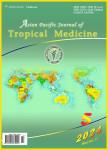Status of intestinal parasitic infections among rural and urban populations, southwestern Iran
Status of intestinal parasitic infections among rural and urban populations, southwestern Iran作者机构:Infectious and Tropical Diseases Research Center Health Research Institute Ahvaz Jundishapur University of Medical Sciences Department of Parasitology School of Medicine Ahvaz Jundishapur University of Medical Sciences
出 版 物:《Asian Pacific Journal of Tropical Medicine》 (亚太热带医药杂志(英文版))
年 卷 期:2019年第12卷第3期
页 面:130-136页
核心收录:
学科分类:1004[医学-公共卫生与预防医学(可授医学、理学学位)] 1002[医学-临床医学] 100201[医学-内科学(含:心血管病、血液病、呼吸系病、消化系病、内分泌与代谢病、肾病、风湿病、传染病)] 100401[医学-流行病与卫生统计学] 10[医学]
基 金:supported by the Infectious and Tropical Diseases Research Center Health Research Institute Ahvaz Jundishapur University of Medical Sciences Ahvaz Iran(Grant No.OG 96106)
主 题:Intestinal parasitic infections Risk factors Iran
摘 要:Objective: To evaluate the prevalence and risk factors of intestinal parasitic infections in the urban and rural areas of Shushtar County,southwest ***: A total of 1 008 fecal samples were analyzed by direct smear examination,formalinether concentration,and Ziehl-Neelsen and trichrome staining; furthermore,PCR was used to distinguish Trichostrongylus and hookworm species based on 28 S rRNA ***: Totally,16.0% cases tested positive,either with a pathogenic or a non-pathogenic parasite. Protozoa were detected in 14.0%,helminths in 1.0%,protozoa and helminth coinfections were detected in 0.3%,and co-infections of two protozoa were detected in 0.7% of cases. The most common protozoa and helminths were Giardia duodenalis(7.7%) and Trichostrongylus spp.(0.5%),respectively. Among five microscopy Trichostrongylus positive cases,Trichostrongylus culbriformis was successfully identified in three isolates by sequencing. In the rural areas,the prevalence of parasitic infection was higher(9.8%) than that in the urban areas(6.2%). A significant association was found between educational level,type of drinking water,animals contact,hand-washing,and clinical symptoms. Conclusions: This study indicates that intestinal parasitic infections remain as a public health priority in Shushtar County. It seems that drinking water and environmental sanitation are the main risk factors of parasitic infections in rural areas.



